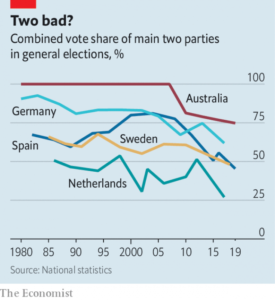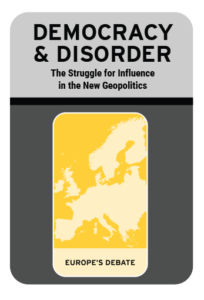 The problems of governance “stem from an excess of democracy,” according to the Trilateral Commission’s 1975 report, The Crisis of Democracy: On the Governability of Democracies.
The problems of governance “stem from an excess of democracy,” according to the Trilateral Commission’s 1975 report, The Crisis of Democracy: On the Governability of Democracies.
But recent trends highlight an odd feature of contemporary politics: it turns the experience of the 1970s upside down, The Economist reports:
Then, inflation was rampant, unemployment high and strikes common. There were riots and assassinations and, in America, conscription into an unpopular war. Yet, with exceptions such as the Watergate scandal, the business of government continued to rumble along. …. Now, matters seem to be reversed. Inflation is tamed, unemployment is low and wages are inching up. But governments are stalemated. Compared with the 1970s, societies are less disorderly but politics is more so.
Ungovernability can be thought of in four ways, it adds:
- First, some countries cannot form a stable government either because (in first-past-the-post systems) the largest party does not command a majority in parliament, or because (in countries with coalitions) parties cannot organise a stable alliance on the basis of election results….
- Next, ungovernability can mean that governments fail to pass basic laws on which the operations of the state depend. Spain’s could not pass a budget this year, triggering the election in April. Italy did pass its budget for 2019, but by busting the financial limits imposed by the eu, though confrontation has so far been avoided…..
 A third aspect of ungovernability is the systematic corruption of constitutional norms, making political processes haphazard or arbitrary. This does not always make countries ungovernable. Sometimes, as recently in Hungary, for example, it does the opposite, increasing state power at the expense of democratic checks and balances. But the undermining of norms can also hamper decision-making, as in Britain….
A third aspect of ungovernability is the systematic corruption of constitutional norms, making political processes haphazard or arbitrary. This does not always make countries ungovernable. Sometimes, as recently in Hungary, for example, it does the opposite, increasing state power at the expense of democratic checks and balances. But the undermining of norms can also hamper decision-making, as in Britain….- Lastly, the past year has seen a return to the streets of mass demonstrations. In France, the gilets jaunes (yellow jackets), a populist grassroots movement, have blocked roads and staged some of the most violent demonstrations the country has seen since 1968. …The nature of these demonstrations, however, is a reminder of what today’s ungovernability is not. It is not mob rule. No one is burning down the presidential palace or executing the king.







